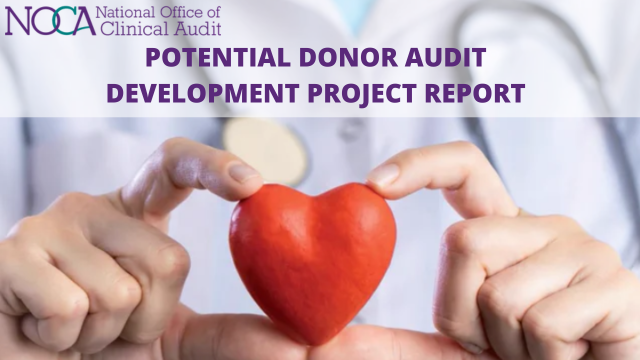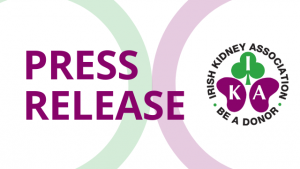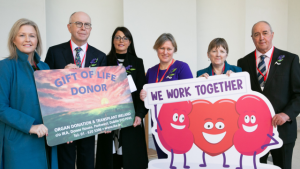The National Office of Clinical Audit (NOCA) published its findings this week in a feasibility study, commissioned by Organ Donation Transplant Ireland (ODTI), to appraise the need for a national clinical audit of organ donation practices.
The aim of the Potential Donor Audit (PDA) is to ensure that every person who is approaching the end of life in ICU and ED is offered the possibility of becoming an organ donor, where this is appropriate.
The Irish Kidney Association, which has been calling for an annual clinical audit of organ donation practices for many years, applauds the commitment of ODTI to the advancement of best practice in the delivery of organ donation and transplantation in Ireland. The last time such an audit was conducted in Ireland was in 2008.
Whilst the commitment to an Annual Potential Donor Audit is commendable and the work of NOCA is excellent, the Irish Kidney Association would like to see provision for the Audit included in the Human Tissue Bill which is expected to be transposed into law later this year. In this way it would put it on a statutory footing and ensure that its delivery is not at risk of the vagaries of changing budgets or possible future recruitment freezes.
In focusing on ensuring that every person who is approaching the end of life in ICU and ED is offered the possibility of becoming an organ donor, where this is appropriate, the NOCA report rightly shines a light on the need to ensure that the organ donation decision of every potential donor is followed through.
To reinforce this focus, the Irish Kidney Association would like to see the inclusion of an opt-in register to run alongside the opt-out register proposed in the Human Tissue Bill, as is the case in the UK. This dual register is operated in the UK. When talking about an opt-in organ donor register Michael O’Leary (Medical Director of the New South Wales Organ and Tissue Donation Service) described it as being ‘incredibly powerful’ in achieving family consent.
In the absence of a comprehensive audit, Ireland has had to infer trends or piece together data from a variety of sources. As part of the study, NOCA looked at the work of NHS Blood and Transplant (NHSBT) in the UK who produce what is widely held to be the gold standard in annual Potential Donor Audits.
The NHSBT report provides rich data at a detailed level which informs future planning within the health service as well as providing useful insights to give focus and direction to national organ donor awareness activities. For example, in the 20 years since they first introduced their annual audit, their data has shown a clear need to increase support for organ donation among black, Asian and minority ethnic communities.
The NOCA report notes that 10 out of 23 potential organ donations did not happen for a variety of reasons from best practice not being followed to lack of family consent.
As with the Human Tissue Bill that is currently working its way through the Dail, there is a need for public education around organ donation. If we are to fulfil the aim of the Potential Donor Audit (PDA), there is a need to bring organ donation into education so that organ donation becomes a natural end-of-life care.
As a patient organisation advocating for the needs of those waiting for a transplant, the Irish Kidney Association has always been aware of looking at organ donation from the perspective of each potential donor and their family. This year’s Organ Donor Awareness Week campaign message was ‘Don’t leave your loved ones in doubt’.
The Organ Donor Card has always been there as an ‘icebreaker’ to encourage families to have the organ donation conversation. If we all know our loved ones’ organ donation decision, it makes the process of giving consent for organ retrieval a little easier. Having fully trained professionals to approach families in instances where the potential for organ donation exists is vital so that opportunities are not missed.
Martina Goggin, an organ donor family member and the Public and Patient Interest Representative on the project working group, spoke powerfully about the importance of health care professionals bringing up the subject of organ donation and doing so at the right time.
Many organ donor families have described organ donation as ‘the one bright light in a very dark time’. The launch of today’s important report offers the promise of bringing us closer to ensuring that organ donation is a realistic option whenever it is a possibility.



